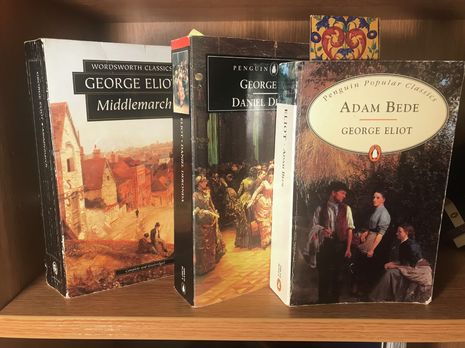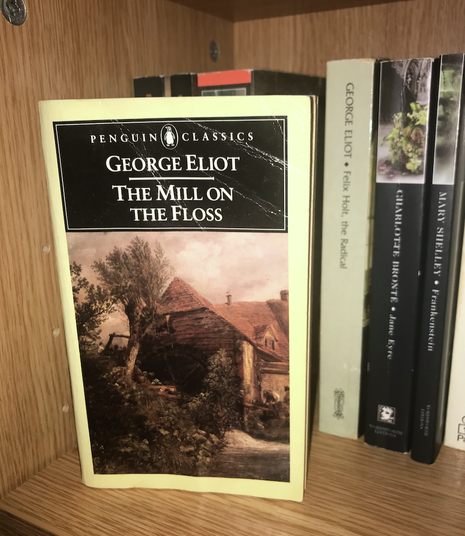On George Eliot and the language of rebellion
Arts columnist Shona Whelan explores the use of dialect in The Mill on the Floss and what this reveals about class, education and independence

Class is at the forefront of Eliot’s The Mill on the Floss, both in definite financial terms and the more tenuous question of socially ‘keeping up’. We see the Tulliver family grapple with finances – from Mr Tulliver’s miller’s business and insistence that Tom have “a good eddication” to their untimely downfall, it is clear that their socioeconomic class has a firm hold on each family member. Eliot writes these characters’ dialogue in a Midlands dialect, adopting phonetic spellings and local slang as they try and navigate a world that often seems beyond their reach. Oftentimes this results in conflict and hostility – Tulliver criticises the “fine-talking men from the big towns” during the opening of the novel, then concedes that the matter of education is “uncommon puzzling”.
“The recognition that their plight isn’t their own fault is refreshing.”
In some ways, this isn’t too far from today – I’m aware of the massive irony of me writing this from my Cambridge room, a place typically perceived as only for the rich. Incidentally, also being from the Midlands, I’ve also faced the inevitable questions “Where’s your accent from?” and “So would you say you’re a Northerner really?” But what can we learn from Eliot’s portrayal of the class divide, and how are language and dialect entangled with identity?

Now, I’m not going to pretend The Mill on the Floss′ ending is a happy one. Drowning in each other’s embrace, the fate of the Tulliver siblings – Maggie and Tom – is undeservedly cruel. Throughout the novel, this is foreshadowed by others’ opinions of them – the feisty, independent Maggie’s equally headstrong father Mr Tulliver warns that a “woman’s no business wi’ being so clever; it’ll turn to trouble”, and Tom’s initial difficulties with running the family business after his father’s passing comes between them. Fate seems set against them from the beginning, with Mr Tulliver being likened to “Oedipus...his deed was inflicted upon him rather than being committed by him”. Eliot has an endearing amount of sympathy for these characters, and the recognition that their plight isn’t their own fault is refreshing.
This is typical of Eliot, being Midlands born and bred herself, and having an interest in morality and ethics in her works. She was compassionate to the characters who she most aligned herself with, this being the most autobiographical of her novels. Though it wouldn’t be accurate to paint Eliot as an ardent social reformer, her celebrations of the experiences of childhood and family tradition shine through here and are treated with much greater sensitivity than a complete outsider might be able to show. Here, insider knowledge is crucial; Eliot writes about what she knows and her own experiences help her create vivid and organic characters for whom we can’t help but feel sympathy.
“This remains constant: a willingness to return to family and their upbringing, whatever the personal cost.”
Equally, language is its own small rebellion. While our protagonist Maggie isn’t necessarily hostile towards all others – she takes the “crippled” Phillip under her wing, for example, despite his father being a longstanding enemy of her own father – she can use it to hold her own. This is shown in her interactions with wealthy suitor Stephen Guest; she tells him “our love would be poison” when he tries to seduce her. Though Maggie is the more strong-willed of the two siblings, both ultimately preserve their dialects, habits and childhood innocence. The last word he speaks to her is “the old childish – Magsie!” – both jubilantly and sadly a reminder of their close childhood bond. Despite the plot of the novel spanning over a decade, this remains constant: a willingness to return to family and their upbringing, whatever the personal cost.
In the end, we can see that whilst all the odds are stacked against the Tulliver siblings – most obviously class, and also gender if we are to consider Maggie in isolation – dialect can be a powerful tool of reconciliation and authenticity. As the narrator asks early on in the novel, “what novelty is worth that sweet monotony where everything is known, and loved because it is known?” Language is a source of constancy and comfort, and Eliot’s use of this is a poignant reminder that whatever the circumstances, your dialect can always be your metaphorical home.
 News / Hundreds of Cambridge academics demand vote on fate of vet course20 February 2026
News / Hundreds of Cambridge academics demand vote on fate of vet course20 February 2026 News / University Council rescinds University Centre membership20 February 2026
News / University Council rescinds University Centre membership20 February 2026 News / Judge Business School advisor resigns over Epstein and Andrew links18 February 2026
News / Judge Business School advisor resigns over Epstein and Andrew links18 February 2026 News / Petition demands University reverse decision on vegan menu20 February 2026
News / Petition demands University reverse decision on vegan menu20 February 2026 News / Caius students fail to pass Pride flag proposal20 February 2026
News / Caius students fail to pass Pride flag proposal20 February 2026










